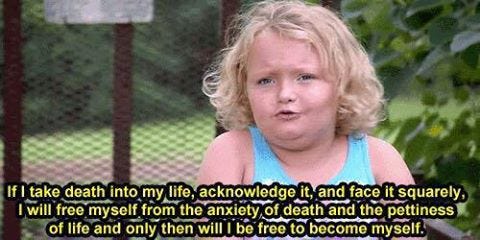Get ready to get yr goth on.
You guys know that feeling when you've quit your job and you're freelancing full-time, and you're like heck yeah, I'm writing again!!! But you also (and retrospectively you understand this was not the best idea, but, you know, hindsight, etc.) have coincided the weaning off of your antidepressant with the beginning of a completely new schedule and routine and set of responsibilities, and so you're like, "Wow I don't know if I love this or hate this or have any feelings about this or about anything at all!"? That feeling, you know it. You get it. So, that's what I've been up to.
Been thinking about you peeps though! Been blundering through the days, some better than others, wanting to find time and emotional energy to write this to you about a book I'm so excited to tell you about, but also feeling that weird shameful urge to just NEVER LOG INTO TINYLETTER AGAIN. A little story about me, dear reader: Over the course of my junior and senior years in high school, I signed up and paid for five different SAT 2 exams, and I blew off each and every one. Just kept waking up the morning of and choosing not to go, then re-enrolling, then doing it again. I never took one (and yet here I am, a college grad; in your fuckin FACE College Board) and my friends started calling the act of ditching something "SAT 2-ing." It doesn't exactly roll off the tongue, I know. The point is: I'm not going to SAT 2 this newsletter.
So about that book.

Lol. Wait, don't go!!!
Okay. Listen. This book, Death: An Oral History by Casey Jarman, is very good. First of all, when I'm in a low, I take solace in music and books and shows that match my mood. My depressive brain got this in the mail and was like, oh yeah, come to mama, eighteen interviews with people who have close — personal or professional or both — ties to death.
I think about death a lot, often against my will, but I've also started to lean into it. What else is there to think about, sometimes, you know? I like that I can feel a renewed vitality after a bout of obsessive thinking about it, a reminder that, hey, right now I'm alive at least. I also believe, naively I'm sure, that if I think about it enough I might be less paralyzed by it when it inevitably becomes less of an abstraction. In the introduction, Casey says he wrote the book "in the hopes of beating death altogether" and I know that this is also why I'm reading it.

(h/t Existential Memes)
Last week, while interviewing Casey for a piece about the book, I found myself asking around the one question I knew he couldn't answer: How do I stop being afraid of death? The question seems to be the driving force of each interview; it's a frustrated but worthwhile pursuit. Casey doesn't have the answer, just as his interviewees (a friend who recently lost her mother, a former death row warden now lobbying against the death penalty, a Black Lives Matter activist, and Art Spiegelman, to name a few) don't, either. What they, and this book, do offer are deeply human stories that are at various points heartbreaking, thought-provoking, and optimistic.
All of this being said, Death is not maudlin or gratuitously morbid. It made me cry, it made me laugh, it made me send a text to my family announcing — change of plans! — that when I die, I no longer want to be frozen until my consciousness can be planted in a robot. I now want to be composted. Immortality is out; becoming a tree is IN.
(Listen guys I don't have links this week because I wasn't keeping track, there's a lot of good stuff on the internet, life is hard, they'll be back next week, ok? ok <3)
Let me know what you're reading, what you're loving, and what kinda fun shit you think your ghost is gonna get into,
Arianna
